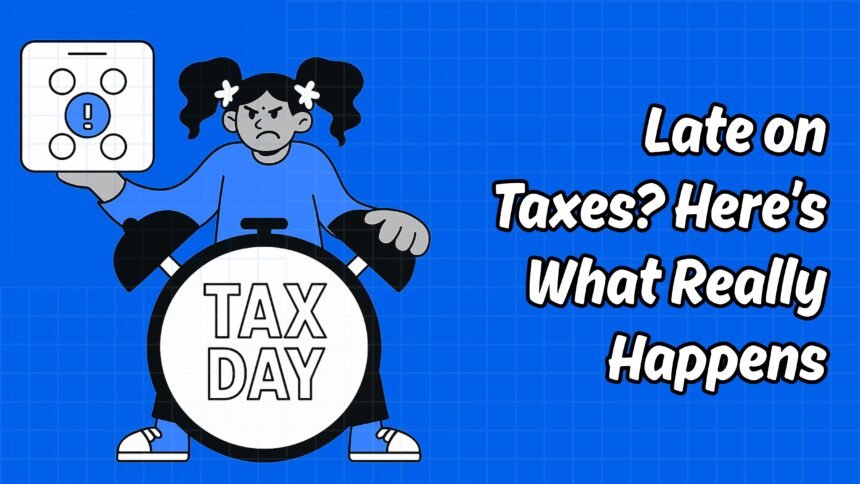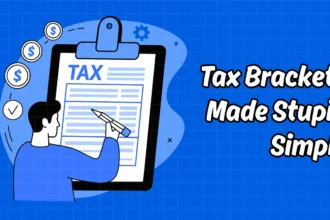Key Takeaways
- Filing Taxes late can trigger steep IRS penalties, but expats with no tax due may avoid them.
- Some IRS forms carry automatic $10,000 fines if missed, even when no tax is owed.
- The IRS can’t directly seize foreign assets but can freeze U.S. assets and revoke passports.
- Expats can catch up penalty-free by filing 3 years of returns and 6 years of FBARs.
- If you can’t pay your tax bill, the IRS offers payment plans and possible penalty relief.
What Happens If You’re Filing Taxes Late?
If you miss the taxes deadline and still owe money, the IRS starts tacking on penalties fast. The main one? A failure-to-file penalty. It’s 5% of your unpaid tax for every month (or part of a month) you’re late. It can grow to 25% total. And that’s before the interest kicks in. That part adds up daily.
Now, if you’re more than 60 days late, there’s a minimum fine. You’ll owe either $485 or the full tax amount—whichever is smaller.
But let’s say you live abroad and don’t actually owe anything. You might not get hit with the late-filing penalty. Many expats qualify for things like the Foreign Earned Income Exclusion (FEIE) or Foreign Tax Credit (FTC). These reduce your bill, sometimes to zero.
Still, even if you owe nothing, ignoring your tax forms can cost you. Big.
There are some forms with automatic $10,000 penalties if you skip them. Here are a few:
- Form 8938 – For foreign financial assets
- Form 5471 – If you own part of a foreign corporation
- Form 3520-A – For foreign trusts tied to a U.S. person
And if you keep filing late—or don’t file at all—you might start hearing from IRS collections. That can mean scary stuff like tax liens. Or losing your passport. Yes, really. That’s part of the FAST Act.
Don’t wait. Even if you can’t pay everything now, file something. The longer you delay, the worse it gets.
Can the IRS Seize Foreign Assets?
Kind of, yeah. It’s tricky though.
The IRS doesn’t have full control outside the U.S. It can’t just show up at a foreign bank and take your stuff. But it has tools. It uses tax treaties, talks to international banks, and works with governments. It’s not instant, but they can come after what’s yours.
Even if they don’t touch your foreign assets directly, they can freeze anything you have back home. Bank accounts, wages, property. They can also block or cancel your passport if the debt’s high enough.
So no, the IRS doesn’t own the world. But if you think being abroad protects you forever, it doesn’t. Best to deal with things early.
How Do I Request a Tax Filing Extension?
Need more time? It’s doable.
Just file Form 4868. For expats, the regular deadline is June 15. Submitting that form gets you until October 15 to file your return.
Important: this only gives you more time to file, not to pay. If you owe tax, you still need to send in the money by April 15. Miss that, and penalties start showing up.
Can You Get a Tax Extension Beyond October 15?
Yes, but it’s not automatic.
As an expat, you can push the deadline further—to December 15. But there’s a catch: you have to write a request to the IRS. Tell them why you need more time.
If you want help, we can handle it for free. We’ll write the request, submit it, and make sure everything’s in order.
There’s more info here: Filing an Extension to December 15
How Do I Catch Up on Back Taxes?
Behind a few years? It happens. A lot of expats don’t realize they’re supposed to file. The IRS knows that, and they’ve set up ways for you to catch up without getting slammed.
Two common programs help:
- Streamlined Compliance Procedures – Great if you genuinely didn’t know. You file 3 years of returns and 6 years of FBARs. No penalties.
- Delinquent FBAR Submission Procedures – For when the only thing you missed was the FBAR. No tax due? You can file without a penalty.
Getting started is easier than it sounds:
- Check your filing need – Not all expats have to file. Depends on your income. If unsure, our team can take a look—free advice.
- See if you qualify for amnesty – These programs are lifesavers if you’re eligible.
- Get your documents – Income records, tax forms, foreign statements.
- File what’s needed – That includes your past returns, FBARs, and any extra forms.
Falling behind isn’t the end. But ignoring it makes things harder. Reach out—we’ll walk you through it, no stress.
How Many Years Should I File Back Taxes?
This part confuses a lot of people.
If you’ve filed your returns before, the IRS usually has three years to audit you. But if you’ve never filed, there’s no limit. They can go back as far as they want.
That said, if you’re an expat trying to catch up, the IRS isn’t asking for your whole life history. In most cases, they’ll just want:
- 3 years of late tax returns
- 6 years of FBARs (foreign bank reports)
That’s it.
And if you didn’t file because you truly didn’t know you had to? You might qualify for the Streamlined Compliance Procedures, which wipes away penalties completely.
So no, you don’t need to dig up tax records from 15 years ago. Just get the most recent few in order and go from there.
How Does the IRS Calculate Late Filing Penalties?
There are two separate penalties here—filing late and paying late. The IRS calculates them differently.
If you file late, the penalty is 5% of your unpaid tax per month. It stops once it hits 25%.
If you pay late, that’s another 0.5% per month. Also maxes out at 25%.
If you’re late on both at the same time, the failure-to-file penalty is reduced by the payment one. It’s still expensive, but not quite as bad as both at full force.
Interest also piles on—daily. It’s based on current IRS rates and compounds over time. The longer you wait, the faster it grows.
And if you file more than 60 days late? There’s a flat penalty: either $485 or your full tax bill, whichever is smaller.
Think the penalty’s unfair? You can ask for penalty abatement, but only if you’ve got a solid reason—like illness or disaster.
Can I Still Get a Refund If I File My Taxes Late?
Yes—but there’s a deadline for that too.
If the IRS owes you a refund, you have three years from the original due date to file and claim it. Miss that window, and the money’s gone. You don’t get it. No appeals.
Here’s the upside: if you’re owed a refund, the IRS won’t hit you with late filing penalties. No tax due, no late fines.
Still, don’t push it. File as soon as you can, just to be safe.
What’s the Difference Between Late Filing and Late Payment Penalties?
They sound alike, but they’re two separate things.
- Late filing means you didn’t submit your return on time.
- Late payment means you didn’t pay what you owed.
Filing late racks up 5% per month, up to 25%.
Paying late is 0.5% per month, also capped at 25%.
If both happen in the same month, the IRS reduces the bigger one a little—but you’re still paying.
Plus, interest keeps building daily on top of both. Even if the penalties max out, the interest keeps going until your balance is cleared.
So the best move? File on time, even if you can’t pay. That cuts down the damage.
What Should I Do If I Can’t Afford to Pay the Taxes I Owe After Filing Late?
First: don’t panic. You’ve got options.
The IRS offers payment plans. You can pay what you owe in monthly chunks. That’s called an Installment Agreement.
There’s also something called an Offer in Compromise. That’s where you settle your tax debt for less than the full amount. It’s hard to qualify, but it’s an option for people in real hardship.
If something serious happened—medical crisis, disaster, loss—you can request penalty relief based on reasonable cause.
And if you’ve got foreign assets and need to catch up, the Streamlined Filing Compliance Procedures or Delinquent FBAR Submission Procedures might help you do that without massive fines.
Whatever you do, talk to the IRS. Don’t ignore them. The longer you wait, the fewer options you have—and the more expensive it gets.








